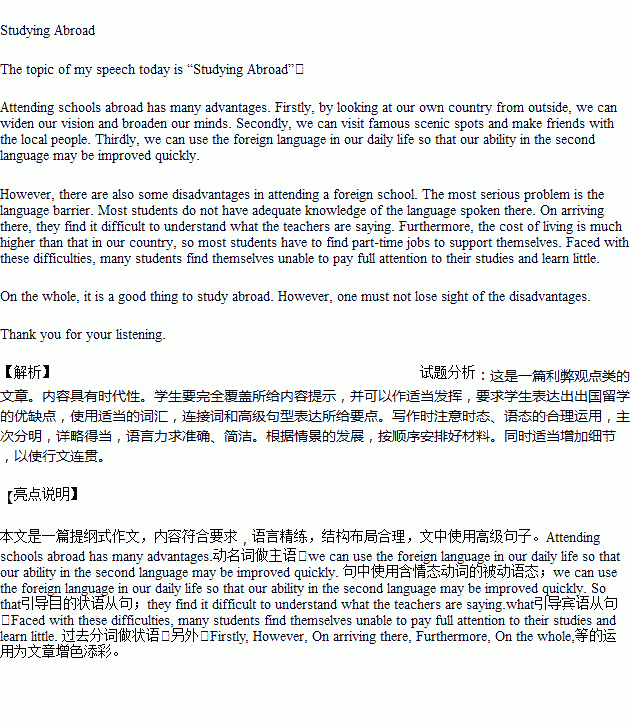ĢāÄæÄŚČŻ
Ėę×ÅĪŅ¹ś¾¼ĆµÄ·¢Õ¹Óė¶ŌĶāæŖ·Å³Ģ¶ČµÄĢįøߣ¬Ō½Ą“Ō½¶ąµÄѧ×Ó×ß³ö¹śĆÅĮōѧÉīŌģ”£øł¾ŻĻĀĆęµÄĢįŹ¾£¬ĒėÄćŅŌ”°Studying Abroad”±ĪŖĢā£¬Š“Ņ»ĘŖ100×óÓŅµÄŃŻ½²ø唣
ÄŚČŻĢįŹ¾£ŗ
1. ³ö¹śĮōѧµÄÓŵć£ŗæŖĄ«ŹÓŅ°£»ĢåŃéµ±µŲµÄ·ēĒ飻½»øü¶ąµÄÅóÓŃ£»øüæģøüŗƵŲÕĘĪÕŅ»ĆÅĶāÓļ”£
2. ³ö¹śĮōѧµÄȱµć£ŗÓļŃŌÕĻ°²»ĄūӌѧĻ°£»·ŃÓĆøß°ŗ£»¶ų»Ø“óĮæŹ±¼ä“ņ¹¤ÓÖ»įÓ°ĻģѧĻ°”£
²Ī漓Ź»ć:ÓļŃŌÕĻ°language barrier£»×ć¹»µÄadequate
____________________________________________________________________________________________
____________________________________________________________________________________________
____________________________________________________________________________________________
____________________________________________________________________________________________
____________________________________________________________________________________________
____________________________________________________________________________________________
____________________________________________________________________________________________
_____________________________________________________________________
 ĢģĢģĻņÉĻŅ»±¾ŗĆ¾ķĻµĮŠ“š°ø
ĢģĢģĻņÉĻŅ»±¾ŗĆ¾ķĻµĮŠ“š°ø Š”ѧɜ10·ÖÖÓÓ¦ÓĆĢāĻµĮŠ“š°ø
Š”ѧɜ10·ÖÖÓÓ¦ÓĆĢāĻµĮŠ“š°ø

 bear according to the passage?
bear according to the passage?